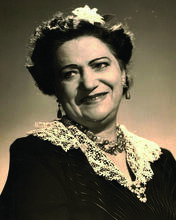Berta Gersten
Regal and soft-spoken, Berta Gersten graced the Yiddish stage for decades, playing a wide range of leading roles to great critical acclaim. Gersten's big break was in 1908 in Mirele Efros. In 1915 she played the lead in Leon Kobrin’s Yisroel’s Hofnung, opening the way to several roles and an invitation to join the original cast of Maurice Schwartz’s Yiddish Art Theater with Jacob Ben-Ami, who became a lifelong friend. She acted with the company in New York and on tours until 1950. She then transitioned to English-language theater in 1954, playing across from Ben-Ami in The World of Sholom Aleichem and making her Broadway debut in Clifford Odet’s The Flowering Peach. Her last theater performance was My Father’s Court in 1971, again opposite Ben-Ami.
Berta Gersten, a tall, regal, soft-spoken actor, was a highly acclaimed leading lady in the Yiddish art theater movement for fifty years. Her career on the English-language stage, though shorter, was also distinguished.
Early Life
Gersten was born in Cracow, Poland, probably in 1896, the older child and only daughter of Avrom and Meshe (Kopps) Gerstenman. She grew up in an Orthodox family; her father was a religious teacher at a Jewish school. In 1899, the family immigrated to New York, where her mother became a dressmaker, and her father worked as a courthouse translator. Gersten’s acting career began when one of her mother’s clients, many of whom were Yiddish actors, needed a child for a performance.
After finishing elementary school, Gersten worked in a box factory to help support her family. Her interest, however, was the theater. In 1908, she played her first formal role as Shloymele in Jacob Gordin’s Mirele Efros, and subsequently appeared in various Yiddish music halls, including nine months with Kappelman’s Vaudeville House.
Performance Career
In 1915, she enjoyed her first success with a leading role in Leon Kobrin’s Yisroel’s Hofnung [Israel’s hope] at the Tomashefsky Theater. A highly respected actor on the Yiddish stage by 1918, she was invited by Maurice Schwartz, along with Celia Adler, Anna Appel, Jacob Ben-Ami, and Ludwig Satz, to be one of the original members in his Yiddish Art Theater. She remained affiliated with the troupe on an irregular basis until its demise in 1950, playing leading roles in a wide repertoire of Yiddish and European plays in New York, as well as on tours in prewar Poland, South America, and the United States. She also played with other Yiddish companies. Most important, however, was her lifelong affiliation with Jacob Ben-Ami. As his leading lady, she toured South America and the United States regularly, always playing to critical and popular acclaim.
Gersten appeared in two Yiddish films. Best known for her performance of Mirele in Mirele Efros (1939), she also played Pesenyu in Got, Mentsh un Tayvl [God, man, and the devil] (1949).
Her debut on the English-language stage came late in life, at a time when the Yiddish theater had declined significantly. In 1954, she played with Ben-Ami in The World of Sholom Aleichem. That same year she made her Broadway debut in Clifford Odets’s The Flowering Peach, opposite Menasha Skulnik. She also toured with A Majority of One (1959). The role of Benny’s mother in The Benny Goodman Story (1956) remained her only Hollywood film credit. She appeared last opposite Ben-Ami in My Father’s Court at the Folksbiene Playhouse in New York in 1971.
Family and Legacy
In 1911, she married Isaac Hershel Finkel (he later changed his name to Irwin H. Fenn), son of Yiddish actors Morris and Anetta Finkel. Fenn, a professor of mathematics and physics for over forty years at Brooklyn Polytechnic Institute, died in 1960. Their son, Albert Fenn, born in 1912, became a photojournalist and was affiliated with Time magazine for several decades. During the last few years of her life, Gersten lived with Ben-Ami. On September 10, 1972, she died of cancer in New York City.
AJYB 24:144.
American Jewish Biography (1994).
“Berta Gerstin: A Hays-Pulsirendik Yidish Harts Hot Zikh Opgeshtelt” [Berta Gersten: A warm Jewish heart has stopped beating]. Forverts (September 15, 1972): 8.
European Immigrant Women in the United States: A Biographical Dictionary. Edited by Judy Barrett Litoff and Judith McDonnell (1994).
Gersten, Berta. Press clippings, reviews, and photographs. Billy Rose Theatre Collection, New York Public Library, Lincoln Center, NYC, YIVO Institute for Jewish Research, NYC, and Museum of the City of New York.
Gerstin, Berta. “Ikh un Dos Publikum” [The audience and I]. Der Tog (February 3, 1928): 3.
Kobrin, Leon. Erinerungen fun a Yidishen Dramaturg [Memories of a Yiddish playwright]. Vol. 2 (1925).
Leksikon fun Yidishn Teater [Lexicon of the Yiddish theater]. Vol. 1. Edited by Zalmen Zylbercwaig (1931).
NAW modern.
NYTimes Biographical Edition, 1972, and Obituary. September 11, 1972, 40:4.
Perlov, Yitskhak. “Dos Mayestetishe Geshtalt fun Berta Gerstin” [The majestic figure of Berta Gersten]. Forverts (September 15, 1972): 8.
Who’s Who in Hollywood, 1900–1976 (1976).
Who Was Who on Screen, 2d ed. (1977).
WWIAJ (1926, 1928).



